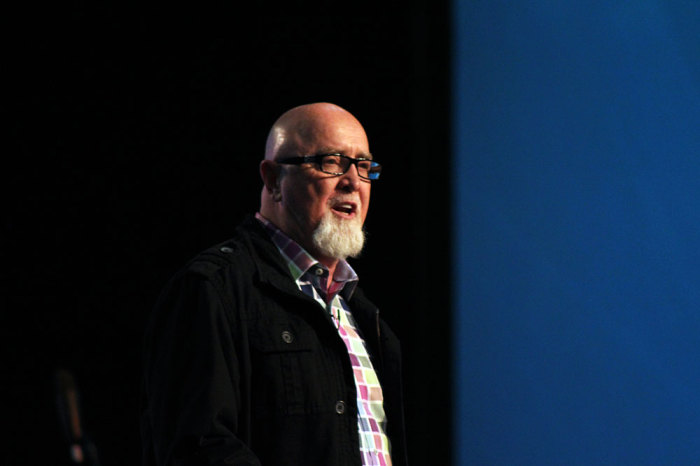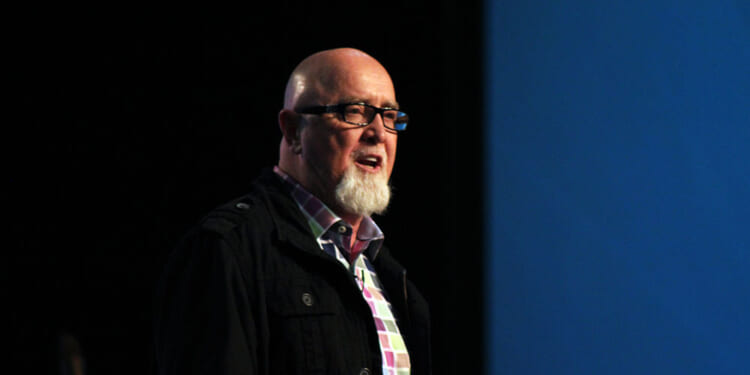
James MacDonald, the founder and former leader of Harvest Bible Chapel in greater Chicago, Illinois, says he has settled defamation lawsuits against his former church and, most recently, radio personality Erich “Mancow” Muller, for nearly $10 million collectively to cap a six-and-a-half-year campaign to clear his name.
“These lawsuits were about anyone who’s ever been slandered by those who believe their microphone makes them untouchable, or their board seat puts them beyond reach,” MacDonald said in a statement Thursday.
“So few have the wherewithal to stand up to such bullies. These costly litigations were only ever about defending my integrity as a minister for the sake of those we led. For ourselves, we have never stopped serving the Lord and have no plans to. I am thankful to close this chapter, allowing me to move forward with my name cleared and my focus fully on ministry again.”
MacDonald sued Muller in 2019, alleging multiple counts of defamation. He sought at least $50,000 in compensatory damages for the spread of allegedly false information, which MacDonald claimed caused him emotional distress and significant harm to his reputation.
He also named Cumulus Media, Inc., a Delaware corporation that owns and operates WLS-A.M. 890 Radio, which used to broadcast Muller’s morning show in Chicago, along with individuals involved in the production of Muller’s podcasts.
The Christian Post reached out to Harvest Bible Chapel and Cumulus Media for comment on MacDonald’s settlement claims. Responses are pending.
His controversial Feb. 12, 2019, ouster from Harvest Bible Chapel was triggered by “highly inappropriate recorded comments” made public on Muller’s radio program as well as “other conduct.”
MacDonald was puportedly recorded talking about planting child pornography on then Christianity Today CEO Harold Smith’s computer and making crude remarks about independent investigative journalist Julie Roys — including joking that she had an affair with former CT Editor-in-Chief Mark Galli — and a vulgar reference to Ed Stetzer, then executive director of the Billy Graham Center at Wheaton College and contributing editor to CT, who had accepted the gift of a Volkswagen Beetle from MacDonald.
The lawsuit claimed the recording broadcast by Muller was made through illegal eavesdropping. It also challenged other allegations made against MacDonald, such as the former pastor allegedly seeking to hire a hitman or trying to plant child pornography on anyone’s computer.
“MacDonald never asked Muller if he could find someone to plant ‘kiddie porn’ on someone’s computer, never asked Muller to find a hitman or any person to kill any of his rivals, and did not conspire to commit murder. Muller intentionally and knowingly fabricated his accusations or acted with reckless disregard for the truth in publishing the above statements so as to constitute actual malice,” the lawsuit argued.
The lawsuit also disputed claims made by a woman identified as Anne Green on Muller’s show, who claimed that MacDonald had inappropriate contact with her during a mission trip.
As the dispute over his ouster erupted in 2019, MacDonald was later investigated for financial abuse. That year, Harvest Bible Chapel published a summary of a legal and financial review of MacDonald’s reign, suggesting he had extensively misused the church’s financial resources for improper financial benefit.
“With this outcome, MacDonald completes his six-and-a-half-year insistence that his former church face legal accountability for false statements they made and paid others to make,” the news release said. “As a result of these legal actions, MacDonald won nearly $10M from defendants who chose large sum settlements, rather than face verdicts exposing the extent of their egregious slander.”
Since being forced out of Harvest Bible Chapel, MacDonald has been involved in helping post-incarcerated and other men struggling with addiction through his Act Like Men Sobriety Houses, headquartered at “Rock Bottom” in Elgin, Illinois.
“I’m ready to turn the page and continue moving forward,” MacDonald declared. “My desire is to help shape a future where broken lives are restored, faith is renewed, and the hope of Christ is never out of reach for anyone.”
MacDonald is still facing a felony charge of assault and battery against a 59-year-old woman in connection to a 2023 traffic incident in California. MacDonald’s attorney, Michael Pancer, said in a statement to The Chicago Sun-Times at the time that the charges were not an accurate portrayal of “what took place.”
Pancer said his client “would never intentionally harm another human being” and that MacDonald’s intent was “neither malicious nor correctly assigned in the charges filed.” MacDonald later said that he was struggling with symptoms of posttraumatic stress disorder when the incident occurred.
Contact: leonardo.blair@christianpost.com Follow Leonardo Blair on Twitter: @leoblair Follow Leonardo Blair on Facebook: LeoBlairChristianPost

















